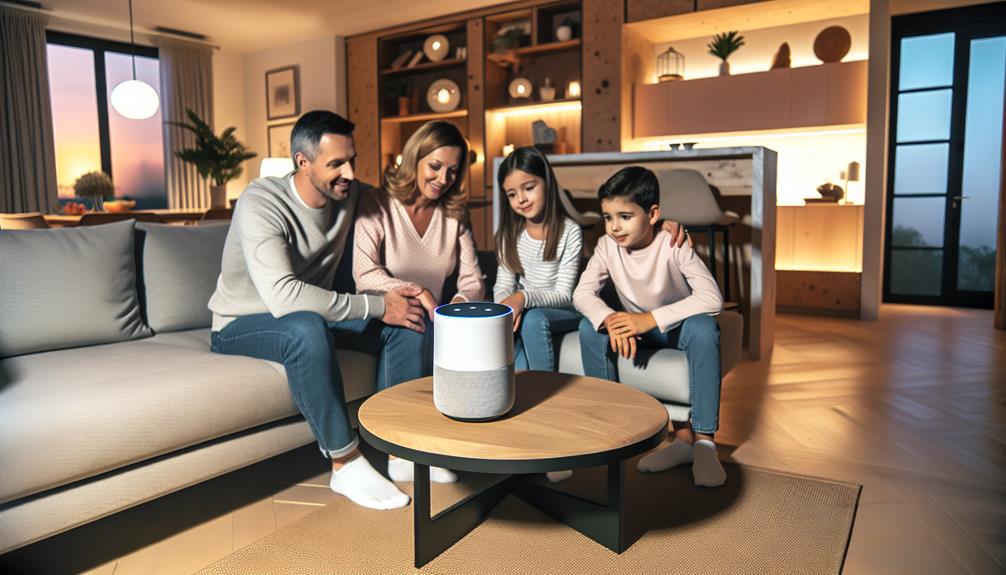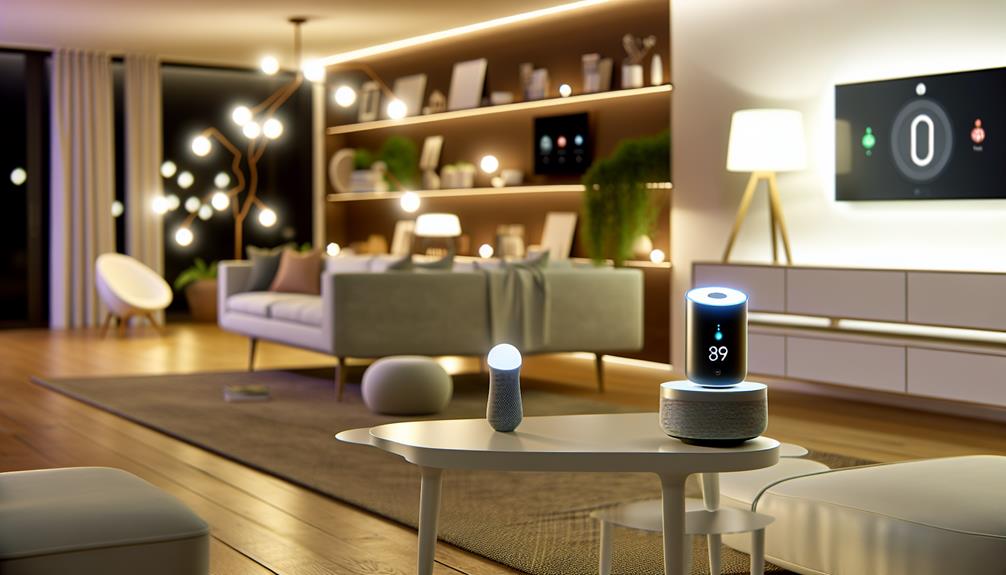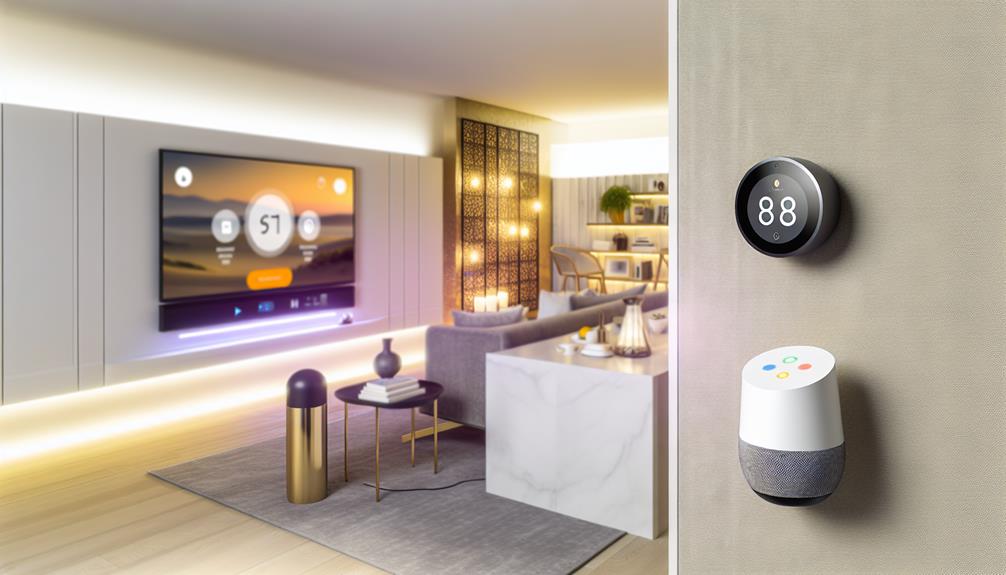7 Advantages of AI-Powered Home Assistants
AI-powered home assistants have increasingly become integral to modern living, offering a range of benefits that enhance the quality of everyday life. From streamlining daily tasks to providing tailored experiences, these systems exemplify the intersection of technology and convenience. Their ability to improve energy efficiency and bolster home security further underscores their value in contemporary households. However, the implications of their continuous learning capabilities and voice-controlled features raise important considerations for user engagement and privacy. Understanding these advantages can illuminate the broader impact of AI on our homes and lifestyles.
Key takeaways
- AI-powered home assistants enhance convenience by automating routine tasks and providing personalized reminders for daily schedules.
- They offer a tailored user experience, adapting recommendations based on individual preferences and habits.
- Continuous learning and improvement through machine learning algorithms ensure that assistants become more reliable over time.
- Smart home management features optimize energy usage, contributing to lower utility bills and environmental benefits.
- Advanced security features, such as facial recognition and intrusion detection, enhance safety and peace of mind for users.
Enhanced Convenience
In today's fast-paced world, the enhanced convenience offered by AI-powered home assistants has become a game-changer for many households. These intelligent systems facilitate task prioritization, allowing users to manage their responsibilities with unprecedented ease. By integrating seamlessly into daily life, these assistants help streamline daily scheduling, ensuring that important tasks are never overlooked.
Imagine waking up to a personalized morning briefing that includes weather updates, calendar appointments, and reminders for essential tasks. AI home assistants excel in organizing daily schedules, enabling families to allocate time effectively and reduce stress. They can prioritize tasks based on urgency and importance, creating a structured approach to even the busiest of days.
Furthermore, the convenience extends beyond mere scheduling. These devices can automate routine household activities, from adjusting the thermostat to managing grocery lists, thereby enhancing overall efficiency.
For individuals seeking a sense of belonging in their busy lives, AI-powered home assistants serve as reliable companions, providing support and facilitating connections among family members. As technology continues to evolve, the role of these systems in enhancing convenience will certainly grow, making them indispensable in modern households.
Personalized User Experience
Personalized user experiences are a cornerstone of AI-powered home assistants, enabling them to deliver tailored recommendations and suggestions that align with individual preferences.
Through adaptive learning and growth, these systems continuously refine their understanding, ensuring that interactions become increasingly relevant over time.
Additionally, a robust contextual understanding of user preferences allows for a seamless integration into daily routines, enhancing overall satisfaction and engagement.
Tailored Recommendations and Suggestions
Tailored recommendations and suggestions have emerged as a cornerstone of the user experience in AI-powered home assistants, enhancing the way individuals interact with technology. By leveraging dynamic content curation and user behavior analysis, these systems can deliver a personalized touch that resonates with users' preferences and needs.
Key benefits of tailored recommendations include:
- Customized playlists that evolve with your musical taste.
- Recipe suggestions based on dietary preferences and past meals.
- Smart reminders for appointments and tasks that reflect your routines.
- Home automation settings that adjust according to your lifestyle.
- Content discovery that introduces you to new books, movies, and activities aligned with your interests.
These personalized interactions create a sense of belonging, as users feel understood and catered to.
The ability of AI-powered home assistants to analyze individual behavior guarantees that suggestions are not just random, but relevant and timely. This fosters a deeper connection between technology and its users, ultimately leading to a more satisfying and engaging home environment.
As these systems continue to evolve, the role of tailored recommendations will certainly expand, further enriching the user experience.
Adaptive Learning and Growth
Adaptive learning mechanisms have revolutionized the user experience within AI-powered home assistants, enabling these systems to evolve alongside their users. By leveraging machine learning algorithms, these assistants analyze interaction patterns and user feedback to enhance behavior prediction and personalize responses. This continuous refinement fosters deeper user engagement, as the system becomes increasingly attuned to individual preferences.
The importance of data privacy is paramount, ensuring that users feel secure while their assistants learn from their habits. Additionally, the scalability of these systems allows them to accommodate growing datasets without sacrificing performance, making them suitable for a diverse range of households.
The table below highlights key aspects of adaptive learning in AI-powered home assistants:
| Feature | Description | Impact on User Experience |
|---|---|---|
| Machine Learning | Algorithms that improve over time | Personalized interactions |
| User Feedback | Input from users to inform changes | Enhanced satisfaction |
| Behavior Prediction | Anticipating user needs | Seamless experience |
| Algorithm Refinement | Continuous improvement of functions | Increased reliability |
In this dynamic environment, AI-powered home assistants not only respond to user needs but also grow with them, creating a more cohesive living experience.
Contextual Understanding of Preferences
The ability of AI-powered home assistants to interpret and respond to user preferences is considerably enhanced by contextual understanding. This capability fosters a more personalized user experience, ensuring that interactions are not only efficient but also meaningful.
By integrating contextual awareness and preference tracking, these assistants can adapt to the unique needs and habits of each user.
Consider the following scenarios that illustrate this dynamic:
- Morning Routine: Automatically brightening the lights and playing soft music when a user wakes up.
- Cooking Assistance: Suggesting recipes based on dietary preferences and available ingredients.
- Entertainment Choices: Recommending movies or music that align with the user's mood and past selections.
- Home Environment: Adjusting temperature settings based on the weather and user comfort levels.
- Shopping Needs: Remembering frequently purchased items to streamline grocery shopping.
Through these examples, it becomes clear that AI-powered home assistants enhance the sense of belonging by creating an environment that feels intuitive and responsive.
Such contextual understanding not only enriches daily life but also fosters a deeper connection between users and their digital companions.
Improved Energy Efficiency
AI-powered home assistants play an essential role in enhancing energy efficiency through smart thermostat control and automated lighting management.
By intelligently adjusting temperature settings based on user behavior and environmental conditions, these systems can greatly reduce energy consumption.
Similarly, automated lighting management optimizes usage, ensuring lights are only on when needed, thereby contributing to lower utility bills and a reduced carbon footprint.
Smart Thermostat Control
Leveraging advanced algorithms and real-time data, smart thermostat control markedly enhances energy efficiency in modern homes.
These intelligent devices not only optimize heating and cooling schedules but also integrate seamlessly into broader smart home ecosystems.
Through intuitive user interface design, homeowners can easily monitor and manage their energy consumption, fostering a sense of empowerment and community around sustainable living.
Key features of smart thermostat control include:
- Adaptive Learning: Automatically adjusts settings based on your schedule.
- Remote Access: Monitor and control your home's climate from anywhere.
- Energy Reports: Provides insights into usage patterns and savings.
- Integration with Other Devices: Works harmoniously with smart home systems.
- Voice Control: Adjust temperatures effortlessly through voice commands.
Automated Lighting Management
Many homeowners are discovering the benefits of automated lighting management systems, which greatly enhance energy efficiency within their living spaces. These systems leverage smart sensors and wireless connectivity to optimize light intensity based on user preferences and environmental conditions. With scheduling automation, homeowners can program their lighting to adjust automatically, ensuring that energy is not wasted when rooms are unoccupied.
The incorporation of mood lighting allows for ambient adjustments, creating a welcoming atmosphere while simultaneously conserving energy. Remote control capabilities further enhance user engagement, empowering individuals to manage their lighting preferences from anywhere in their home.
| Feature | Benefits |
|---|---|
| Smart Sensors | Detect occupancy to reduce energy usage |
| Scheduling Automation | Automatically adjusts lighting based on time |
| Safety Features | Provides illumination when needed, ensuring security |
Seamless Integration
In the modern smart home ecosystem, seamless integration stands as a cornerstone for enhancing user experience and functionality. The ability to connect various devices and systems effortlessly is essential for effective home automation. AI-powered home assistants excel in this area, allowing users to coordinate multiple devices while ensuring user privacy and data security.
Consider the following aspects that illustrate the advantages of seamless integration:
- Voice recognition capabilities for hands-free control across devices.
- Device compatibility that supports an array of household products.
- Multi-device support enabling simultaneous management of different systems.
- Consistent system updates that enhance performance and security.
- Troubleshooting assistance readily available through user feedback.
With robust internet connectivity, AI home assistants facilitate a cohesive environment where lights, thermostats, and security systems communicate effectively.
This interconnectedness not only simplifies daily tasks but also promotes a sense of belonging as users gain confidence in their smart home systems. By prioritizing seamless integration, these assistants empower individuals to curate a personalized experience, responding intuitively to their needs while safeguarding their privacy and data.
Advanced Security Features
Advanced security features are paramount in the domain of AI-powered home assistants, providing users with peace of mind while enhancing the overall functionality of smart home systems.
These advanced systems utilize facial recognition technology to identify and authenticate individuals, guaranteeing that only authorized users can access sensitive information or areas of the home. Additionally, intrusion detection capabilities allow for immediate alerts in case of unauthorized access, thereby reinforcing the home's security.
Real-time alerts keep homeowners informed of any unusual activity, while thorough activity monitoring provides a detailed log of events, enhancing awareness and control. Remote surveillance options enable users to keep an eye on their property from anywhere, making it easier to respond swiftly in emergencies.
The integration of emergency response features guarantees that help is just a command away, providing an essential layer of safety. Access control settings allow for customizable permissions, while privacy settings empower users to manage their data securely.
Moreover, secure communication protocols protect against potential threats, enabling effective threat assessment. Overall, these advanced security features not only safeguard the home but also foster a sense of belonging and security for all occupants.
Voice-Controlled Accessibility
One of the most transformative aspects of AI-powered home assistants is their ability to facilitate voice-controlled accessibility, making smart home environments more inclusive for individuals with varying needs. The integration of advanced voice recognition accuracy and hands-free operation empowers users to interact seamlessly, regardless of physical limitations.
This technology serves as a crucial component of assistive technology, enhancing user interface design to accommodate diverse capabilities.
Key features that promote voice-controlled accessibility include:
- Real-time feedback that guarantees commands are executed accurately and promptly.
- Speech synthesis quality that offers clear, intelligible responses, fostering better communication.
- Multi-device compatibility allows users to control various smart devices effortlessly.
- Language support guarantees inclusivity for non-native speakers, enhancing user experience.
- Ambient intelligence creates a responsive environment that adapts to individual preferences.
While these advancements hold great promise, user privacy concerns remain critical.
Balancing accessibility and security guarantees that all users can benefit from AI-powered home assistants, leading to a more connected and supportive living space.
Continuous Learning and Adaptation
AI-powered home assistants are increasingly recognized for their ability to learn and adapt over time, enhancing user interaction and overall functionality. Through advanced machine learning techniques, these systems analyze user feedback and identify usage patterns, allowing them to provide tailored responses that align with individual preferences. This ability not only fosters a sense of belonging but also enhances the overall user experience.
As these assistants undergo regular system updates, their algorithm efficiency improves, enabling them to handle a wider array of tasks with greater accuracy. This application versatility guarantees that users can rely on their assistants for diverse needs, from managing schedules to controlling smart home devices.
Furthermore, trend analysis enables these systems to anticipate user requirements, creating a proactive rather than reactive interaction model.
While the continuous learning capabilities of AI assistants offer significant benefits, it is vital to address data privacy concerns. Developers must prioritize robust security measures to protect sensitive information, fostering trust among users.
Frequently Asked Questions
Can Ai-Powered Home Assistants Work Offline?
AI-powered home assistants can operate offline through local processing capabilities, enabling voice recognition without internet connectivity. This functionality enhances user privacy and guarantees seamless operation, fostering a sense of belonging within smart home environments.
Are There Privacy Concerns With Using AI Home Assistants?
In a world reminiscent of Orwell's "1984," privacy concerns surrounding AI home assistants emphasize the need for robust data security and transparent user consent. Balancing convenience with confidentiality remains essential for fostering trust among users.
How Do AI Assistants Handle Multiple Users?
AI assistants employ user recognition and personalization strategies to cater to multiple users, enabling tailored responses and seamless interactions. This adaptability fosters an inclusive environment, ensuring that each individual's preferences and needs are effectively addressed.
Can These Assistants Integrate With Third-Party Smart Devices?
AI assistants can indeed integrate with third-party smart devices, enhancing overall functionality. However, users may encounter compatibility issues, necessitating effective device management strategies to guarantee seamless operation and ideal user experience within interconnected environments.
What Happens if the Internet Goes Down?
The theory of internet dependency raises concerns about functionality during outages. Many AI-powered home assistants possess limited offline functionality, enabling basic operations. However, advanced features and integrations typically require an active internet connection to function effectively.



